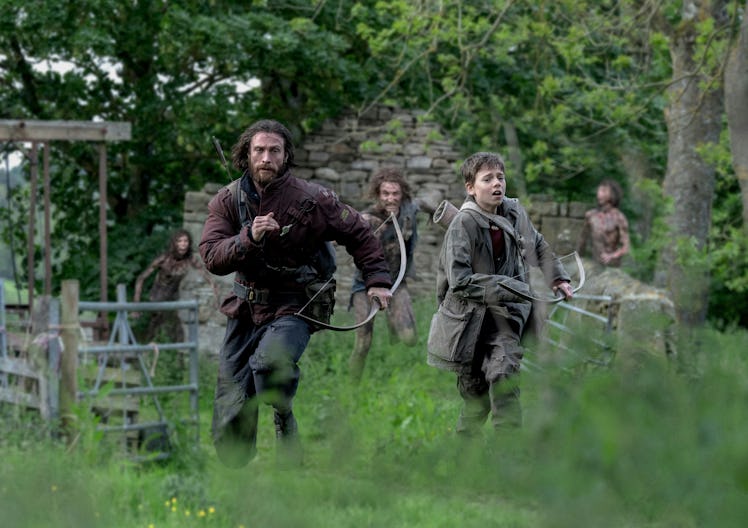What 28 Years Later Can Tell Us About Men Today
Danny Boyle’s zombie trilogy is a timely and important meditation about masculinity.

Will it take a zombie apocalypse to fix masculinity? The thought occurred to me as I sat in a theater taking in Danny Boyle’s 28 Years Later the other day. This intense, gory, nudity-laden flick was also one of a surprisingly heartwarming journey for a young boy, Spike, who doesn’t buy into his community’s view of the world. Everyone around him is fearful, incurious, and readily accepts convenient and clear falsehoods about their lives. Spike seeks hope, even if it requires him to face the violent, cruel, and potentially fatal real world off his island.
I won’t spoil too much in the way of the plot but I will say that the way the story speaks to masculinity — wading through lost men, toxic lies, and not-so-symbolic alpha males (in the form of one truly terrifying zombie) — is thoughtful and fresh. In context of the cultural landscape for boys and men today, it’s the kind of exploration we could really use.
Two months ago, Scott Galloway, a professor of marketing at NYU and media tour de force affectionately known on his podcast as Prof G, took to The View to talk, as he does so often, about masculinity.
“I like the idea of restoring an aspirational vision of masculinity,” he said to a room that seemed, a bit surprisingly, in total agreement. “I don’t think there’s anything wrong with leaning into your femininity or masculinity if it feels natural.”
In his view, this vision of masculinity involves three pillars: provider, procreator, and protector.
In 28 Years Later, Spike becomes the provider, chasing the health care his mom needs that his dad ignores.
When it comes to the provider, “every man at the outset of his career should take economic responsibility for his household. Sometimes that means getting out of the way” of your more successful partner, he says, and other times it means stepping up. For procreation, he says we should channel “that fire of desire… the right ways [to] make you a better man — kinder, stronger, thinking about how you dress … showering, for God’s sake.”
Finally, he says that in an aspirational vision of masculinity, “your default operating system is protection.” This is a more gentle and empathetic pillar than it might sound on its face. “A lot of women don’t feel safe on the subway,” he explains, “or they see men walking down the street, they cross the sidewalk.” This is due to men eschewing their duty as protector. And “it’s not just physical,” he continues. “When you see a group being demonized, your default setting as a man is you move to protection.”
In 28 Years Later, Spike found himself chasing this view of masculinity headlong: providing the health care his mom needed that his dad would not, protecting her from zombies and himself from indoctrination, not exactly chasing procreation (he’s 12) but rejecting his father’s philandering example. The fact that he lives in a post-apocalyptic landscape in many senses brings clarity to his vision. When there are no worldly comforts, moral clarity arises.
Danny Boyle and Prof G have this in common: They’re both speaking to the broadest possible audiences about things that so many men primarily discuss with, well, other men. With 28 Years Later raking in over $100 million at the box office already and The View’s audience being, well, The View’s audience, it’s refreshing to see such discussion spilling out into the public.
Masculinity is making a comeback. It’s time to talk about it.